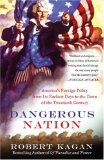Summary | Excerpt | Reviews | Beyond the Book | Readalikes | Genres & Themes | Author Bio
America's Place in the World from Its Earliest Days to the Dawn of the Twentieth Century
by Robert Kagan

Critics' Opinion:
Readers' Opinion:
First Published:
Oct 2006, 544 pages
Paperback:
Nov 2007, 544 pages
 Book Reviewed by:
Book Reviewed by:
BookBrowse Review Team
Buy This Book
Like most expansive peoples—the Greeks and Romans, for instance—Anglo-Americans did not view themselves as aggressors.20 In part, they believed it only right and natural that they should seek independence and fortune for themselves and their families in the New World. Once having pursued this destiny and established a foothold in the untamed lands of North America, continued expansion seemed to many a matter of survival, a defensive reaction to threats that lay just beyond the ever-expanding perimeter of their English civilization. The French and Spanish empires were competing with the English for control of North America. And the Indian nations, defending their own shrinking territories and, indeed, their very existence against European aggression, were a constant threat to the settlers’ security—at least from the settlers’ perspective. Native Americans pushed off one stretch of land, and fearing they would soon be pushed off the next, frequently struck back, both out of vengeance and in the hopes of convincing the settlers to halt their advance and retreat. Settlers under siege, and the governments charged with protecting them, could easily view the Indians as the aggressors and their own actions as aimed at establish- ing nothing more than a minimal level of security. Attaining even minimal security, however, required an ever-enlarging sphere of control and dominance, for whenever one boundary of security was established, other threats always existed just beyond it. The “original sin” of displacing the first Indians from their lands began a cycle of advance and conquest. As Catherine the Great is supposed to have remarked, “I have no way to defend my borders but to extend them.” And indeed, what has been said of Russia, that it found its security only in the insecurity of others, could be said of colonial Anglo-Americans, too. In the seventeenth and eighteenth centuries, they purchased their security at the price of the insecurity, and often the ruin, of Pequot, Iroquois, and Narragansett, of French and Spaniards, and by the time of the Revolution, of the British, too.
The Expansionist “Mission”
The search for security, however, was not the sole motive for expansion. There were other powerful motives as well, and more exalted justifications. The Anglo-American settlers pressed into territories claimed by others in the conviction that they were serving a higher purpose, that their expansion was the unfolding of an Anglo-Saxon destiny. They saw themselves as the vanguard of an English civilization that was leading humanity into the future. The first American exceptionalism was really an English exceptionalism, the first American mission an Anglo-Saxon, Protestant, imperial mission. Even the Virginia Company portrayed itself as more than a purely commercial entity. The company’s stockholders insisted theirs was a different kind of commercial enterprise, “the ends for which it is established beinge not simply matter of Trade, butt of a higher Nature.” Clearing away the wilderness and implanting English civilization in its place was in their eyes an inherently noble task, as well as being lucrative. While making money for themselves and their London stockholders, the colonists would “bring the infidels and salvages lyving in those partes to humane civilitie and to a setled and quiet govermente.” Not for the last time in American history, these early settlers made their way forward in the conviction that enterprise, trade, and the advance of civilization were interlinked. Their civilization, they believed, was beneficial both for those who advanced it and for those upon whom it was advanced. This Anglo-American mission was neither passive nor “exemplarist,” however. The settlers moved ever forward; they did not stand still. And they did their converting with their hands, their tools, and their weapons, not by the force of their example.
Excerpted from Dangerous Nation by Robert Kagan Copyright © 2006 by Robert Kagan. Excerpted by permission of Knopf, a division of Random House, Inc. All rights reserved. No part of this excerpt may be reproduced or reprinted without permission in writing from the publisher.





The House on Biscayne Bay
by Chanel Cleeton
As death stalks a gothic mansion in Miami, the lives of two women intertwine as the past and present collide.

The Flower Sisters
by Michelle Collins Anderson
From the new Fannie Flagg of the Ozarks, a richly-woven story of family, forgiveness, and reinvention.

The Funeral Cryer by Wenyan Lu
Debut novelist Wenyan Lu brings us this witty yet profound story about one woman's midlife reawakening in contemporary rural China.
Your guide toexceptional books
BookBrowse seeks out and recommends the best in contemporary fiction and nonfiction—books that not only engage and entertain but also deepen our understanding of ourselves and the world around us.